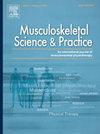肌肉骨骼分诊物理治疗师的观点对他们的作用,病人的旅程和接口分诊诊所的实施在爱尔兰初级保健
IF 2.2
3区 医学
Q1 REHABILITATION
引用次数: 0
摘要
目的 探讨肌肉骨骼分诊临床专科物理治疗师(CSPs)对患者就医过程的看法,以及他们对在爱尔兰初级医疗机构实施肌肉骨骼分诊界面诊所的可接受性的看法。方法 采用主题方法进行定性描述研究设计。在爱尔兰城市和农村地区的 8 家医院与 11 名 CSP 进行了半结构化焦点小组讨论。数据分析包括两个阶段的框架:主题分析,然后通过规范化过程理论(NPT)的视角探讨界面诊所的实施结果:结果确定了四个主题:(1) MSK 路径的发展;(2) 临床管理;(3) 界面诊所的实施;(4) 物理治疗的角色和身份。界面诊所在一定程度上实现了CSP的 "连贯性"(即有意义)和 "认知参与"(即促进参与),期望患者在治疗过程中更早地接受专业的MSK护理。然而,如果界面诊所没有作为更广泛的综合医疗路径的一部分来实施,如果诊所设立在主医院附近而不是更广泛覆盖区的初级医疗地点,那么这对社区医疗服务提供者的益处就较小。CSP对 "集体行动 "提出了强烈建议,如发展综合护理路径和初级医疗物理治疗并为其提供资源、投资信息技术基础设施(电子健康记录)以及获得检查(如核磁共振成像/X光)的能力。本文章由计算机程序翻译,如有差异,请以英文原文为准。
Musculoskeletal triage physiotherapists’ perspectives on their role, the patient journey and implementation of interface triage clinics in primary care in Ireland
Objectives
To explore musculoskeletal triage clinical specialist physiotherapists’ (CSPs) perspectives on the patient journey and their perspectives on the acceptability of implementing MSK triage interface clinics in primary care in Ireland.
Methods
A qualitative descriptive study design using a thematic approach was conducted. Semi-structured focus groups were conducted with 11 CSPs in 8 hospitals with urban and rural catchment areas across Ireland. Data analysis involved a two-stage framework; thematic analysis, followed by exploration of the findings on interface clinic implementation through the lens of Normalisation Process Theory (NPT).
Results
Four themes were identified: (1) Development of MSK pathways; (2) Clinical governance; (3) Implementation of interface clinics and (4) Physiotherapy role and identity. Interface clinics achieved some degree of ‘coherence’ (i.e. made sense) and ‘cognitive participation’ (i.e. fostered engagement) for CSPs with the expectation of patients receiving expert MSK care earlier in their journey. However, this was less beneficial to CSPs if interface clinics were not implemented as part of a wider integrated care pathway, and if clinics were established near the main hospital instead of primary care locations in the wider catchment area. CSPs conveyed strong recommendations on ‘collective action’ such as development and resourcing of integrated care pathways and primary care physiotherapy, investing in information technology infrastructure (electronic health records) and obtaining the ability to order investigations (e.g. MRI/x-ray).
Conclusions
These findings contribute new knowledge about MSK triage CSPs’ perspectives on the patient journey through MSK services in Ireland, which can inform future implementation phases of MSK triage interface clinics.
求助全文
通过发布文献求助,成功后即可免费获取论文全文。
去求助
来源期刊

Musculoskeletal Science and Practice
Health Professions-Physical Therapy, Sports Therapy and Rehabilitation
CiteScore
4.10
自引率
8.70%
发文量
152
审稿时长
48 days
期刊介绍:
Musculoskeletal Science & Practice, international journal of musculoskeletal physiotherapy, is a peer-reviewed international journal (previously Manual Therapy), publishing high quality original research, review and Masterclass articles that contribute to improving the clinical understanding of appropriate care processes for musculoskeletal disorders. The journal publishes articles that influence or add to the body of evidence on diagnostic and therapeutic processes, patient centered care, guidelines for musculoskeletal therapeutics and theoretical models that support developments in assessment, diagnosis, clinical reasoning and interventions.
 求助内容:
求助内容: 应助结果提醒方式:
应助结果提醒方式:


